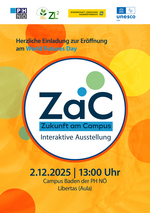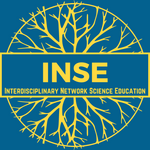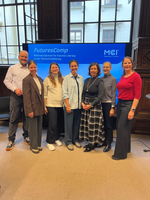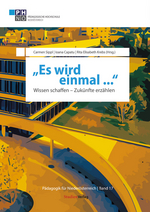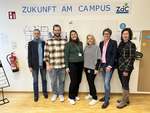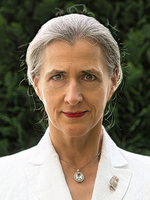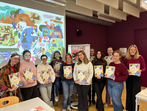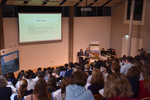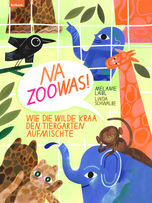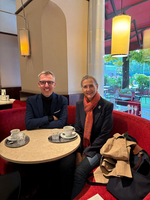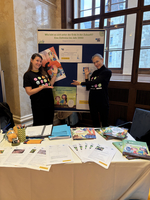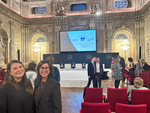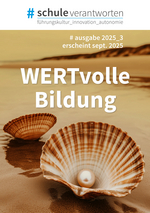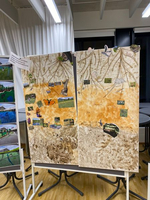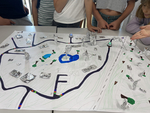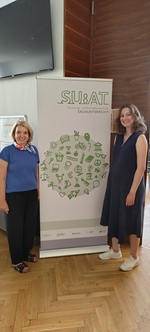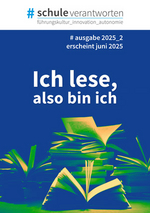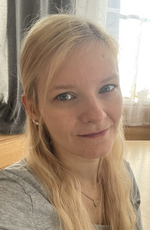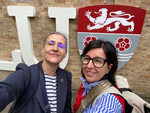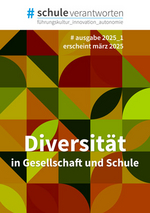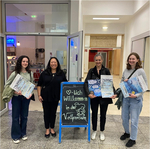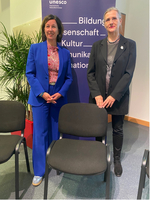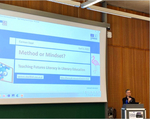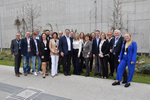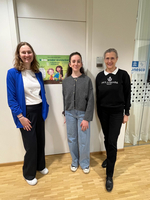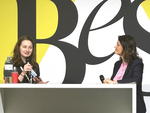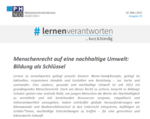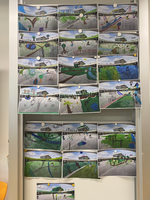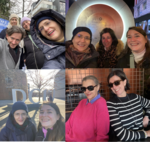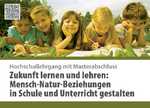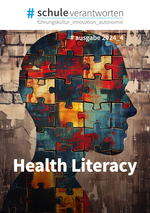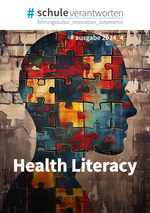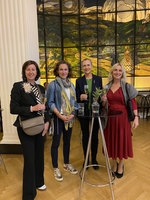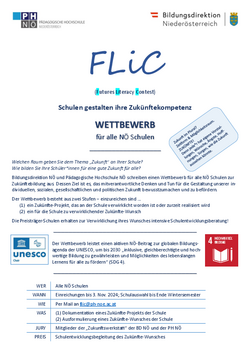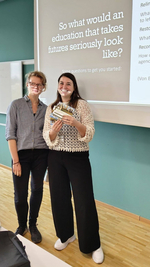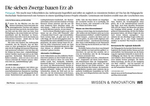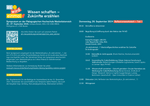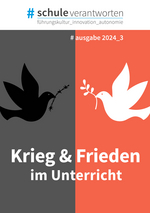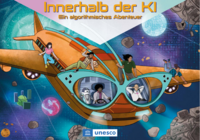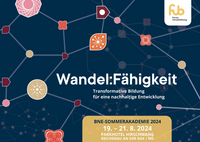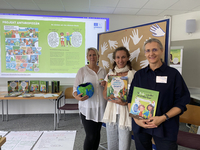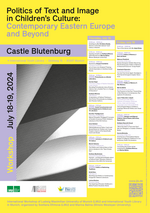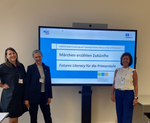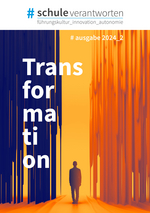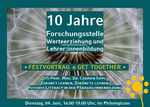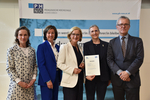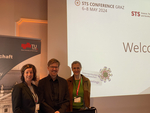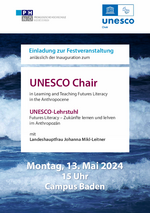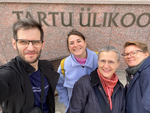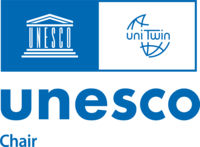Brotkrümelnavigation:
Main content:
News
Episode 12 of the podcast Zukünfte•Bildung has been released
On January 19, 2026, the twelfth episode of the podcast “Zukünfte Bildung” was released and is dedicated to the project Zukunft am Campus (ZaC). In this episode, Christian Haider talks with Carmen Sippl and Karin Tengler, Chairholder and Co-Chairholder of the UNESCO Chair, as well as with Ioana Capatu from the Center for Futures of Education, about the project Zukunft am Campus (ZaC). ZaC is an interactive exhibition that opened on December 2 for World Futures Day. Interactive stations invite visitors to think about, explore, and imagine the future in all its diversity.
The podcast can be listened to either via the PH Niederösterreich website or on Spotify!
Episode 11 of the podcast Zukünfte•Bildung has been released
On December 15, 2025, the eleventh episode of the podcast “Zukünfte Bildung” was released and is dedicated to the Interdisciplinary Network for Science Education Lower Austria (INSE). In episode 11, “The Forest of the Future,” Eva Feldbacher, project manager of INSE and research associate at WasserCluster Lunz, talks with Ioana Capatu about the project’s goals, structure, and partner institutions. She provides insights into interdisciplinary pilot studies that explore new approaches to science education. The episode concludes with the special audio story “Der kluge Waldgeist”.
You can listen to the podcast either via the PH Niederösterreich website or on Spotify.
Starting signal for FuturesComp
How can futures literacy be integrated into Austrian higher education? On behalf of the BMFWF, the UNESCO Chairs at MCI and PH NOE collaborated to create a reference framework for futures literacy that can serve as a guide for implementing futures education in higher education teaching. To this end, key competencies were identified, a competency model was developed, learning objectives were described, and exemplary learning scenarios were formulated. FuturesComp was presented to higher education development stakeholders for the first time at the implementation workshop on 11 December 2025. Initial steps for implementation were then identified in a future workshop format.
Intersections between science education and futures literacy
What do research into a changing reality and imagining a sustainable future have in common? The anthology “One day there will be …”: Creating knowledge—narrating futures explores the intersections between science education and futures literacy. It presents research-led and tried-and-tested concepts that demonstrate the importance of interdisciplinary and transdisciplinary approaches in promoting curiosity about research and strengthening trust in science in schools and universities. The focus is not on the narrative of technological progress, but rather on the exploration of world knowledge in a creative combination of scientific, cultural, and artistic practices. In the Anthropocene, ecological awareness of the interconnection between humankind and nature, culture and technology is the basis for the joint responsibility of shaping sustainable futures.
Table of contents
To the report on “Bildung im Dialog”
World Futures Day am Campus Baden der PH NÖ
On 2 December 2025—World Futures Day—the first interactive ZaC exhibition opened at the Baden campus of the PH NOE. It is dedicated to the question: What is the future? Five interactive stations invite visitors to think, explore, talk and dream about the future in all its diversity:
- Curtain: What feelings does the word “future” evoke in you?
- Audio: What is the future?
- Image: What kind of future do you want?
- Points: What is the value of the future?
- Postbox: What do you wish for your personal future and for the future of the world?
ZaC (Future on Campus) is a project of the UNESCO Chair in Learning and Teaching Futures Literacy in the Anthropocene.
UNESCO Chair Advent Calendar
From 1 to 24 December 2025, the UNESCO Chair Advent Calendar of the University College of Education Lower Austria (PH NOE) will open a window every day to knowledge, wonder and global responsibility: valuable inspiration for a tomorrow that we are shaping together. Each window invites us to shape the future together. Many thanks to Karin Tengler for the wonderful idea!
Episode 10 of the podcast Zukünfte•Bildung has been released
In the ninth episode, Ioana Capatu from the Centre Futures Literacy talks with Carmen Sippl, Chairholder of the UNESCO Chair and Head of Centre Futures Literacy, about a project that brings together her two passions: futures and literature. Carmen Sippl speaks about her career path, cultural sustainability, the Anthropocene, human–nature relations in literature, futures literacy, and “reading for the future.”
You can listen to the podcast either via the PH Niederösterreich website or on Spotify.
Science Education & Futures Literacy with the raven "Wild Kraa"
On 11 November 2025, author Melanie Laibl presented her latest book at the University College of Teacher Education in Lower Austria. Together with students specialising in ‘Culture Opens Worlds’, she discussed a topic that is significant for the relationship between humankind and nature: freedom. In the book, Melanie Laibl gives a narrative voice to a raven: ‘Wild Kraa’ wants to explain the meaning of freedom to the inhabitants of a zoo, of all places. NA ZOOWAS! (Leykam, 2025), illustrated by Linda Schwalbe, is a book that invites readers to change their perspective: How do the zoo animals see the free bird, and how do they see the people outside their bars? And what does ‘freedom’ mean to each of them? The change of perspective offered by the picture book NA ZOOWAS! opens up numerous possibilities for science education and futures literacy. In cooperation with the project ‘INSE – Interdisciplinary Network for Science Education Lower Austria’, a pedagogical guide to the picture book is now being developed, which will present teaching examples for primary schools.
To the report on ‘Bildung im Dialog’
To the interview and podcast with Melanie Laibl
To the picture book
Multiplier Event – October 22, 2025 at the University College of Teacher Education Lower Austria
On October 22, 2025, the final event of the Erasmus+ project CultureNature Literacy (CNL) took place at the Baden Campus of the University College of Teacher Education Lower Austria (PH NÖ). Under the leadership of PH NÖ, the three-year project produced a wide range of didactic impulses for cultural sustainability and an education that promotes future-oriented thinking in the Anthropocene. Vice-Rector Edda Polz opened the event with a quote from John Dewey, emphasizing the importance of collaborative research and discovery. Berbeli Wanning and Jana Mikota (University of Siegen) presented Books that Stir Ecological Awareness and introduced the emerging research field of Plant Studies. Author Melanie Laibl discussed the creation of her non-fiction picture books and her creative collaboration with illustrators in a studio talk with Carmen Sippl. In the afternoon, workshops offered practical inspiration for classroom practice – from drama pedagogy with Ioana Capatu (PH NÖ) and future visions inspired by picture books in the Futures Stories Lab with Carmen Sippl (PH NÖ). The interconnection of social and technological aspects in education was explored in the workshop Envisioneer! with Emanuele Bardone (University of Tartu), while Water Poetry was experienced during a literary-ecological walk along the Badener Mühlbach with Anke Kramer (Droste Research Center of the LWL Literature Commission for Westphalia). To the report on “Bildung im Dialog”
Episode 9 of the podcast Zukünfte•Bildung has been released
In the ninth episode of the podcast “Zukünfte⋅Bildung”, Carmen Sippl from the UNESCO Chair on Futures Literacy at the University College of Teacher Education Lower Austria and author Melanie Laibl discuss a topic of great significance to us: freedom.
In her new picture book, Melanie Laibl gives her narrative voice to a raven. The wild Kraa sets out to explain to the zoo’s inhabitants what freedom means.
How does the bird’s-eye view influence storytelling? And what possibilities does this shift in perspective open up for futures-oriented education?https://www.ph-noe.ac.at/wissenschaftsbildung
Exchange on the intersections of political education and futures literacy
How can young people be inspired to take an interest in politics—and how can they develop positive visions of the future in the process? Lars Castellucci, Member of the German Bundestag and Federal Government Commissioner for Human Rights Policy and Humanitarian Aid, and Carmen Sippl from the UNESCO Chair at the PH NOE explored the intersections between politics and futures literacy at a working breakfast. The formats presented in the UNESCO Chair's methods mosaic can provide a wealth of inspiration for futures thinking, for example with the narrative approach of the Futures Stories Lab. In the understanding of futures literacy as a competence for shaping the future, they offer scope for making individual and collective possibilities for action visible. They could therefore be put to good use in the Pizza & Politics discussion format initiated by Lars Castellucci. We look forward to further exchange and cooperation for futures literacy.
Futures Literacy at the Lower Austria Research Festival
What will life be like under the earth in the future? That was the initial question posed at the UNESCO Chair's station at the Lower Austria Research Festival on October 10, 2025, at the Palais Niederösterreich in Vienna. The multilingual craft and reading corner at this station invited visitors to change their perspective: the young researchers imagined a day in the life of an underground dweller. They took a journey through time into the future: how will the ground have changed in 2050? What will life be like in the future? Future scenarios emerged from the perspective of animals, plants, and stones. The resulting future stories offer the research team at the UNESCO Chair valuable insights into young people's visions of the future and how their imagination can be strengthened through the futures literacy pedagogy.
UNESCO-Chair at "For Women in Science"
On October 7, L’Oréal-UNESCO „For Women in Science“ Fellowships were awarded at the Österreichischen Akademie der Wissenschaften(Austrian Academy of Sciences). The aim of the award is to support outstanding early-career female researchers and to highlight their excellent scientific achievements. Four scientists were honored in a festive ceremony for their impressive research contributions. Karin Tengler and Ioana Capatu from the UNESCO Chair “Learning and Teaching Futures Literacy in the Anthropocene” at the University College of Teacher Education Lower Austria (PH NÖ) also attended the event and warmly congratulate the awardees on this prestigious recognition.
Thinking Space Futures VI: Reflecting values in the Futures Workshop
Values are the inner compass for human action. Values education is a task and part of the general educational goal of schools. Futures literacy, which aims to strengthen the imagination in order to envision livable, sustainable futures and recognize the steps needed to realize them, should therefore also integrate values education. This “Thinking Space Futures” presents the sustainability values described in the European Competence Framework for Sustainability GreenComp and relates them to the values of the European Union and the need for a planetary perspective in the Anthropocene. The cultural subjects, which focus on art, music, literature, and language, offer inspiring opportunities to develop value reflection skills while jointly exploring possible life plans for the future.
Episode 8 of the podcast Zukünfte•Bildung has been released
In the eighth episode, Ioana Capatu and Rita Krebs from the Center for Futures⋅Education talk with Astrid Wittmannfrom the Department of Educational Science at the University College of Teacher Education Lower Austria (PH NÖ) and Karin Tengler, Co-Chair of the UNESCO Chair and research associate at the Department of Media Education.
Together, they explore the Futures Workshop held in the 2024/25 school year at the Practice Primary School of the University College of Teacher Education Lower Austria, focusing on the topic of soil.
In collaboration with the teachers of the two fourth-grade classes, five learning units on the future of soil were developed with the children.
Envisioning futures with Ozobots
As part of the summer school that took place from august 11th until august 14th 2025 at the University College of Teacher Education Lower Austria in cooperation with the city of Baden, students in grades 4 to 8 immersed themselves in the city of the future. After an introduction to visual programming of small robots, known as Ozobots, they developed creative visions of the future – from flying cars and sustainable supply systems to floating classrooms. Supervised by two students and led by Karin Tengler, the participants implemented their ideas in mini-projects, gaining playful insights into technology, programming and shaping the future.
SU:AT Congress in Graz: The future is in the soil
From 2 to 4 July, the SU:AT Congress of the Research and Competence Centre for General Studies took place for the first time in Graz. The hosts were the Augustinum Private University of Education and the University of Education Styria.
A particular highlight of the congress was the presentation by Astrid Wittmann (Department of Educational Sciences) and Rita Krebs (Centre Futures Literacy and the UNESCO Chair at the University of Education Lower Austria). They presented the "Zukünftewerkstatt" on the topic of soil, which was carried out at the University of Education Lower Austria's elementary school – a forward-looking project that met with great interest.
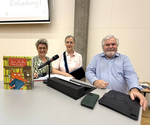
Children reading for the future
Futures Literacy put to the test: As their final exam, the primary teacher students organised a reading festival for the pupils of the practical primary school on the Baden campus of the University College of Teacher Education Lower Austria as part of the ‘Children reading for the future’ seminar. At each of their stations, they explored a picture book with the children in a reading dialogue and with a variety of creative tasks. The event kicked off with a reading duet by PVS Director Claudia Pinkl and PH NOE Rector Erwin Rauscher, who presented ‘Mr Fox Likes Books’ by Franziska Biermann. The most important goal: to promote the joy of reading and thus the motivation to read as an essential futures skill.
Thinking Space Futures V: Reading for the Future
Futures literacy is an educational concept that teaches the skills needed to shape the future. The term 'literacy' indicates that these skills, including reading and writing, should be accessible to all. This 'futures thinking space' focuses on reading as a means of enabling social participation in the context of literacy. Literature plays a significant role in making possible, probable and desirable futures imaginable. Literary texts are rehearsal rooms for the imagination. 'Reading for the Future' is therefore an important methodology in the field of future education. The concept of 'Reading for the Future' is presented as an example to be recommended for both pedagogical practice and individual reflection.
New support at the Centre Futures Literacy and UNESCO Chair for Learning and Teaching Futures Literacy in the Anthropocene
The UNESCO Chair and the Centre Futures Literacy are delighted to announce that Jennifer Grobauer will now be supporting our team! Her enthusiasm and organisational talent will be a real asset to the team when it comes to planning and implementing our research and development projects.
We are looking forward to working with her!
CultureNature Literacy meets Visual Pedagogies
As part of the 8th International Conference of the Association for Visual Pedagogies entitled “Imagining Sustainable Developments, Discussing Education Futures” from June 11 to 13, 2025 at Lancaster University (UK), the UNESCO Chair at the University College of Teacher Education Lower Austria presented the Erasmus+ project CultureNature Literacy (CNL). Carmen Sippl, Ioana Capatu (virtual) and Karin Tengler presented the concept of CultureNature Literacy (CNL) as an educational approach in the Anthropocene as part of their panel “CultureNature Literacy: Learning and Teaching Cultural Sustainability in the Anthropocene”. They use literary, drama and media pedagogical methods to make complex ecological relationships understandable and tangible. These visual forms of representation—for example through narrative, performative, artistic and multimedia forms of expression—were presented as examples.

Designing Futures, Conveying Knowledge
During a guest lecture on may 27th 2025 at the University of Education Lower Austria, Anthropocene researcher Reinhold Leinfelder opened up new perspectives on scientific education in the 21st century. The Anthropocene, an interdisciplinary concept based on Earth system research and planetary boundaries, calls for a future-oriented redesign of human-nature relationships. It offers a variety of approaches for schools and universities – from STEM subjects to the humanities and cultural studies. Leinfelder, known for his innovative approaches to science communication, emphasised the importance of communicating complex concepts in an understandable way in his seminar "Kinder lernen Fachsprachen kennen". He particularly highlighted the potential of comics and graphic novels as 'slow media' that help children and young people transition to technical language and encourage them to reflect on questions about the future. He is associated with the PH NÖ through his cooperation in the research and development project "Learning and teaching the Anthropocene" and in the Erasmus+ project "CultureNature Literacy (CNL)". The PH NÖ has named the fourth year of its primary school teacher training programme after him.
To the report on "Bildung im Dialog": https://www.ph-noe.ac.at/de/news/news-detail/zukuenfte-gestalten-wissen-vermitteln
Thinking Space Futures IV: futures literacy pedagogy as lived diversity
Futures literacy pedagogy creates spaces of possibility in which possible, probable and desirable futures can be imagined and alternative future scenarios can be developed. Such co-creative processes require openness to the views and experiences of others, appreciation of cultural diversity and respectful intergenerational dialogue. In the cultural space of schools, cultural education provides inspiring impulses to turn educational policy buzzwords into lived diversity. This ‘Thinking Space Futures’ presents the framework concept of the Inner Development Goals (IDGs). It shows the school as an organisation and the people working in it the abilities, skills and inner qualities they need to be able to shape sustainable and regenerative futures. A methodological example is used to illustrate how the concept can be utilised for future education.
Vzdelávanie o budúcnosti vytvára priestor možností, v ktorom si možno predstaviť možné, pravdepodobné a želané budúcnosti a rozvíjať alternatívne scenáre budúcnosti. Takéto spolutvorivé procesy si vyžadujú otvorenosť voči názorom a skúsenostiam iných, uznanie kultúrnej rozmanitosti a rešpektujúci medzigeneračný dialóg. V kultúrnom priestore škôl poskytuje kultúrna výchova inšpiratívne impulzy na premenu módnych slov vzdelávacej politiky na prežívanú rozmanitosť. Tento „Thinking Space Futures“ predstavuje rámcovú koncepciu vnútorných rozvojových cieľov (IDGs). Ukazuje škole ako organizácii a ľuďom, ktorí v nej pracujú, schopnosti, zručnosti a vnútorné vlastnosti, ktoré potrebujú, aby mohli formovať udržateľné a regeneratívne budúcnosti. Na metodickom príklade sa ilustruje, ako možno tento koncept využiť pre vzdelávanie v budúcnosti.
Futures Literacy meets Climate Literacy
The Center for Climate Literacy at the University of Minnesota teaches and researches what educators need to address climate justice in the classroom. Jana Lo Bello Miller used a working visit to Austria to discuss the concepts of Futures Literacy and CultureNature Literacy with the UNESCO Chair team at the University College of Teacher Education Lower Austria. Her examples showed in a wonderful way how these concepts intertwine: in working with images and narratives, storytelling and visualisation. We are grateful for the inspiring impulses and look forward to further collaboration!
Futures Literacy and the Futures of Conservation Areas
The Austrian UNESCO Commission invited the 13 Austrian chairs to a networking meeting at the Carinthia University of Applied Sciences on 28/29 April 2025. The joint topic: "Protected areas—about material and imaginative spaces of preservation and change from an interdisciplinary perspective". Carmen Sippl and Karin Tengler from the UNESCO Chair at the University College of Teacher Education Lower Austria presented their concept of viewing landscapes as ‘learnscapes’ (Sippl & Tengler, 2020) as a method for practising futures thinking: Why should we preserve a natural condition or a cultural achievement of the past, and what significance do they have for our future? For example, the landscapes in the Hohe Tauern National Park—project partner in the Erasmus+ project ‘CultureNature Literacy: Key Competences for Shaping the Future in the Anthropocene’—tell a variety of stories, which in turn form the starting point for a ‘Futures Stories Lab’, one of the methods being developed at the UNESCO Chair in Learning and Teaching Futures Literacy in the Anthropocene to promote the imagining of possible and desirable futures. Natural-cultural interdependencies and planetary changes caused by human influences are researched and sustainable futures are imagined. The Futures Literacy Pedagogy being developed at the UNESCO Chair creates transformative learning experiences to practise future thinking and imagine a sustainable future.
Report on "Bildung im Dialog"
Report on the website of FH Kärnten
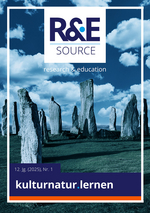
CultureNature Literacy: Learning to understand the Anthropocene with literature
How can literature help to open up new perspectives on nature and the environment for young people? The current article on CultureNature Literacy (CNL) by Ioana Capatu and Carmen Sippl shows how literary learning can be developed as a key competence in the Anthropocene. The focus is on an innovative teaching scenario that was trialled at lower secondary level. The starting point is language-playful texts by author Melanie Laibl, in which animals, plants, stones or fungi have their say and provide surprising insights into their living environment. These stimulating texts invite a change of perspective and encourage pupils to understand nature and humans as an inseparable unit. For example, a seed becomes a philosopher of the future, a wolf visits a self-help group with a bear, and a mushroom goes in search of a partner on the ‘Wood Wide Web’. The CNL learning scenario presented teaches a key skill for the Anthropocene: the ability to look at the environment from unusual perspectives in order to promote empathy, appreciation and responsibility towards the world around us. The accompanying research as part of the Erasmus+ project ‘CultureNature Literacy (CNL): Key school skills for shaping the future in the Anthropocene’ emphasises the potential of literary perspective-taking in the classroom.
Cow's milk and plant-based alternatives in the classroom: sustainability and nutrients in the focus of science lessons
A new article in the journal R&E-Source by the UNESCO Chair examines the potential of cow's milk and plant-based alternatives such as oat, soya and almond drinks as an exciting topic for secondary school science lessons. The article offers a comprehensive comparison of the products in terms of their protein, carbohydrate and fat content as well as their ecological impact - including global warming potential, land use and water consumption. Teachers are given practical suggestions on how they can use this topic to promote both analytical skills and awareness of sustainable consumption among secondary school students. The discussion of milk and milk alternatives is used as a learning opportunity to address informed consumption decisions in the context of the climate crisis and to reflect on social and political responsibility. The article is rounded off with specific suggestions for incorporating the topic into chemistry, biology and environmental education lessons - a valuable contribution to future-oriented education.
Futures Literacy: Method or Mindset?
From 2 to 4 April 2025, the teff Academy hosted the Cologne Future Fiction Makerspace at the MESH der Universität zu Köln for the first time. Participants from all over Europe explored cultural perspectives on futures thinking and foresight. The aim was to strengthen the role of imagination and narrative methods in shaping future educational processes.
One highlight was the keynote inspiration by Carmen Sippl, Chairholder of the UNESCO Chair in Futures Literacy, who used a picture book to demonstrate in a practical way how future skills can be anchored in literary education. In an accompanying workshop, she also presented the "Futures Stories Lab", a method for fostering futures literacy in educational contexts.
To the report on "Bildung im Dialog": https://www.ph-noe.ac.at/de/news/news-detail/zukuenftebildung-methode-oder-mindset
Shaping the future: EDU|days 2025 in the context of AI and educational change
This year's EDU|days on april the 8th and 9th 2025, a conference for teachers of all subjects who use or intend to use digital media in a reflective and critical way in the classroom, focussed on shaping the future in the age of artificial intelligence. Teachers, as key players in the transition, discussed the potential and challenges of artificial intelligence in the classroom. The UNESCO Chair was represented by Karin Tengler, who was able to exchange ideas with many like-minded people and make new contacts at the EduDays. In workshops and lectures, it became clear that the future is created where education is shaped courageously, critically and with visionary thinking - in the interplay of responsibility, technology and humanity.
Review of the EDU|days 2025: https://www.edudays.at/nachlese-2025/
To the report on „Bildung im Dialog“: https://www.ph-noe.ac.at/de/news/news-detail/zukuenfte-gestalten-neue-perspektiven-fuer-lehren-und-lernen-im-zeitalter-kuenstlicher-intelligenz
New intern at the Center Futures Literacy and the UNESCO Chair for Learning and Teaching Futures Literacy in the Anthropocene
The UNESCO Chair and the Center Futures Literacy are pleased to welcome our new intern, Morgane Cretin-Reina, from École normale supérieure Paris-Saclay in Paris! With a focus on graphic design and expertise in science communication, she will support ongoing projects, especially INSE, the Network for Science education. Her focus is particularly on the graphic presentation of scientific content in order to convey complex topics in an understandable and appealing way.
We are looking forward to the collaboration and exciting exchanges!
To the report on "Bildung im Dialog": https://www.ph-noe.ac.at/de/news/news-detail/design-trifft-auf-dialog-next-generation-science-communication
UNESCO Chair at the BeSt career fair
The Centre for Future Education and the UNESCO Chair were represented at the BeSt careers fair that took place from march 12th to march 15th. Rita Krebs informed interested visitors about the primary school teaching degree programme at the University College of Teacher Education Lower Austria during a discussion round with colleagues. During the discussion, she provided valuable insights into the programme content and admission requirements. There was particular interest in the requirements for the entrance exam and the wide range of career prospects after graduation.
To the report on "Bildung im Dialog": https://www.ph-noe.ac.at/de/news/news-detail/best-2025-buehne-frei-fuer-deine-zukunft
Newsletter #lernenverantworten 23: Human right to a sustainable environment – education is key
A brief overview of the university course Learning and Teaching the Future was published on 10 March in the #lernenverantworten newsletter, which has been published since 2023. The course starts in the winter semester 2025, and registration is still open until 2 May. The aim of the course is to secure the right to a clean, healthy and sustainable environment - through education!
Schools play a central role in teaching young people the values of sustainability and how to treat existing resources with care, empathy and responsibility. By integrating global challenges such as climate change and biodiversity loss into the classroom, teachers empower students to make sustainable choices - for a more just and liveable future.
Future Workshop "Soil" – Children shape sustainable futures
Soil is an essential foundation of life. However, its increasing use threatens these functions. How can children be made aware of the importance of soil and involved in shaping sustainable future solutions?
The Future Workshop "Soil" provides answers—an innovative educational format developed at the UNESCO Chair and as part of the research project Learning Future, Teaching Futures (ZL²) at the University College of Teacher Education Lower Austria. Here, children reflect on current soil usage, develop creative future visions, and bring them to life through drama-based scenarios. The Future Workshop took place in the school year 24/25.
For more information, visit: https://www.ph-noe.ac.at/en/research/research-and-development/futures-literacy
To the report on "Bildung im Dialog": https://www.ph-noe.ac.at/de/news/news-detail/zukunftswerkstatt-boden.
Inspiration in Dublin
The team from the UNESCO Chair Learning and Teaching Futures Literacy in the Anthropocene took advantage of an Erasmus+ Staff Mobility to not only experience immersive language training in Dublin, but also to gather inspiration for Futures Literacy. The exhibition ‘Take A Breath’ at the Irish Museum of Modern Art offered an impressive multi-perspective artistic exploration of breathing and the threat to air in the Anthropocene. The Dublin Portal is an artistic network that enables intercultural encounters via livestream 24/7. An exchange on the intersections of Futures Literacy and Possibility Studies took place at Dublin City University with Vlad Glaveanu.
To the report on "Bildung im Dialog"
Help shape the future – at your school!
Master's degree programme: ‘Learning and teaching the future: Shaping human-nature relationships in schools and lessons’
Future education enables transformative learning experiences in participatory learning spaces - in order to face an uncertain future characterised by climate change, war and artificial intelligence with each other, for each other and to each other. The university course with a Master's degree in ‘Learning and Teaching the Future - Shaping Human-Nature Relationships in Schools and Classrooms’ offers educators the opportunity to professionalise their ability to address global challenges in the local school context in a fact-based, critically reflective, creative-artistic and future-oriented manner. It starts in the winter semester 2025. Take part and strengthen yourself for the transformation of our society! All information on registration and dates can be found HERE.
Thinking Space Futures III
‘All is well!’ Whether we perceive these words, which we encounter every day in various situations, as a phrase of appeasement or as an affirmation of wishful thinking in the midst of turbulent times could have an impact on the future. After all, Futures Literacy as the capability of shaping the future not only has a personal, and a social dimension, but also a planetary one. What does this mean for schools as cultural centres and what role can cultural education play in this? Part III of the ‘Thinking Space Futures’ series in the journal #schuleverantworten sheds light on the concept of Planetary Health, which links the thematic focus of Health Literacy with the Anthropocene framework: healthy planet, healthy people. Planetary Health therefore represents a target orientation for futures education.
“Tudo está bem!” O facto de entendermos estas duas palavras, que encontramos todos os dias em várias situações, como uma frase de apaziguamento ou como uma afirmação de desejo no meio de tempos turbulentos pode ter um impacto no futuro. Afinal, a literacia do futuro, enquanto competência para moldar o futuro, não tem apenas uma dimensão pessoal e social, mas também uma dimensão planetária. O que é que isto significa para as escolas enquanto centros culturais e que papel pode a educação cultural desempenhar neste contexto? A Parte III da série “Thinking Space Futures” da revista #schuleverantworten lança luz sobre o conceito de Saúde Planetária, que combina o foco temático da Literacia em Saúde com o quadro do Antropoceno: planeta saudável, pessoas saudáveis. A saúde planetária representa, portanto, uma orientação para a educação futura.
Who's afraid of GMOs?
The issue Health Literacy of the journal #schuleverantworten features the article „Wer hat Angst vor GMOs? Naturwissenschaftliches Grundwissen über Lebensmittel als wichtiger Bestandteil der Futures Literacy und Health Literacy“ by Rita Krebs. The article sheds light on the importance of scientific education in the context of modern nutrition technologies. In particular, it addresses the role of genetically modified organisms (GMOs) in the food debate and shows how pupils can develop a critical awareness of future challenges through sound knowledge.
By linking futures literacy and natural sciences in the Anthropocene, the article offers practical approaches for teaching and provides impetus for an objective discussion of controversial topics.
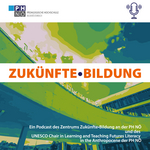
New Podcast „Zukünfte⋅Bildung“: Imagining a sustainable future
The Center for Futures⋅Literacy and the UNESCO Chair invite all interested parties - educators, students, researchers and anyone who is enthusiastic about creative and interdisciplinary educational formats - to immerse themselves in the world of forward-thinking: with the new podcast “Zukünfte⋅Bildung”! New episodes will be released every third Monday of the month, highlighting innovative educational approaches to Futures Literacy and offering exciting insights into shaping a diverse and liveable future. The first episode “Futures Learning and Teaching in the Anthropocene” with Carmen Sippl and Karin Tengler from the UNESCO Chair and author Melanie Laibl was published on 16.12.2024.
Creative visions for the “soil of the future”
On Monday, December 2, 2024, the entry hall of the Baden campus of the University College of Teacher Education Lower Austria (PH NÖ) was transformed into a place of creative future design to mark World Futures Day. Under the motto “Soil of the Future”, interested parties were invited by the Center for Futures⋅Literacy and the UNESCO Chair in Learning and Teaching Futures Literacy in the Anthropocene to work together on an artistic collage and develop new perspectives on sustainability. The activity offered the opportunity to creatively explore the importance of soil for life on earth by means of a collage on soil. In addition, pupils from class 4A of the Praxisvolksschule presented artworks that showed their ideas for the future of the campus courtyard: more nature, space to play and opportunities to explore. These children's visions of the future complemented the presentation of sustainable use and protection of the soil. The event was very well received. Numerous participants contributed their creative ideas and thus contributed to an inspiring and multi-layered collage.
Read more on 'Bildung im Dialog'
Discover world heritage in Baden near Vienna
Baden near Vienna is one of the eleven leading spa towns in Europe that were jointly inscribed on the UNESCO World Heritage List as Great Spa Towns of Europe by the UNESCO World Heritage Committee in 2021. In collaboration with the Austrian UNESCO Commission as well as local stakeholders and educators, the municipality has developed the picture book Badespaß & Kurstadtkipferl (Kral-Verlag, 2024), which explains the UNESCO World Heritage Site in a humorous and contemporary way and uses illustrations to convey it in a playful way. Carmen Sippl and Karin Tengler also represented the UNESCO Chair ‘Futures Literacy - Learning and Teaching Futures in the Anthropocene’ at the University College of Teacher Education Lower Austria at the book presentation on 22 October 2024 at the Hotel Herzoghof. Teaching/learning materials recommending the book illustrated and designed by Julia Stern for use in school contexts are being prepared by students at the University of Teacher Education Lower Austria under the direction of Margarethe Kainig-Huber. The award-winning author Melanie Laibl was on hand to answer questions as an expert in communicating complex content for children and adults who are young at heart.
Futures Literacy Contest (FLiC) for schools has started
The Directorate of Education and the University College of Teacher Education Lower Austria are calling on all schools in Lower Austria to take part in the ‘Futures Literacy Contest’ (FLiC).
The aim of the competition is to promote pupils' skills with regard to shaping the future responsibly. It is not only about the individual future, but also about the social, societal and political future, which they should actively help to shape. All schools in Lower Austria are invited to submit a project that already deals with the topic of the future or is currently being realised. In addition, the schools should formulate a concrete wish for the future that is to be realised at the school. The winners will not receive cash prizes, but something much more valuable: professional school development advice from experts at the University College of Teacher Education Lower Austria, who will support them in realising their visions for the future. Submissions by 3 November 2024 to flic(at)ph-noe.ac.at. Further information and conditions of participation
Crazy Futures at the PH Niederösterreich!
On Tuesday, October 15, 2024, the inspiring "Crazy Futures Workshop" with Liisi Pajula from the University of Tartu took place as part of the Erasmus+ project CultureNature Literacy. Students and staff from PH Niederösterreich imagined "crazy" futures, inspired by utopian and dystopian scenarios, and explored the question: How might education evolve in the future (or futures)? Participants also delved deeply into the challenges of future thinking in the context of the Anthropocene.
Read more on "Bildung im Dialog"
Save the Date: Crazy Futures Workshop
CNL project partner Liisi Pajula from Tartu University introduces us to the challenge of futures thinking in the format of the future workshop: "In the context of the Anthropocene, futures thinking is expected to play an important role in creating radically alternative futures. However, creating alternatives is a challenging activity to carry out. It is often affected by several cognitive biases that extend the known present instead of grappling with the unknown future. Thereby, dominant imaginaries and narratives are often reproduced. During the workshop on CrazyFutures, we take special care to move beyond the probable to engage in more speculative futures by inviting participants to creatively and collaboratively (re-)imagine futures of education." The workshop will be conducted in English.
- WHEN: Tuesday, 15 October 2024, 9 to 12:15 a.m.
- WHERE: room CONCORDIA, HOG 218, Campus Baden.
- Registration in PH-Online or via e-mail to ioana.capatu(at)ph-noe.ac.at
Imagination for Futures Literacy
"One day be there will be …" is the title of a Sparkling Science project in which primary school students engage with a regional raw material in a three-part workshop cycle of fairy tale workshop, circular workshop, future workshop and excursions in order to develop an understanding of how the circular society of the future can function through independent research. At the final symposium, which took place on 26/27 September 2024 in cooperation with the Interdisciplinary Network for Science Education Lower Austria (INSE) at the Baden campus of the University of Teacher Education Lower Austria, the project team led by Robert Kamper (project manager) and Carmen Sippl (scientific director) together with the research partners Institute of Design Research Vienna (IDRV), Ludwig Boltzmann Gesellschaft – Open Innovation in Science Center (LBG OIS) and Montanuniversität Leoben (MUL) presented the initial results of the accompanying research. The resulting teaching/learning materials are available on the project website. Patricia McAllister-Käfer reported in the PRESSE on the importance of imagination for futures literacy.
“Het zal op een dag ...” is de titel van een Sparkling Science project waarin basisschoolleerlingen zich bezighouden met een regionale grondstof in een driedelige workshopcyclus van sprookjesworkshop, circulaire workshop, toekomstworkshop en excursies om een begrip te ontwikkelen van hoe de circulaire samenleving van de toekomst kan functioneren door middel van zelfstandig onderzoek. Op het afsluitende symposium, dat plaatsvond op 26/27 september 2024 in samenwerking met het Interdisciplinair Netwerk voor Wetenschapsonderwijs Neder-Oostenrijk (INSE) op de Badense campus van de Universiteit voor Lerarenopleiding Neder-Oostenrijk, presenteerde het projectteam onder leiding van Robert Kamper (projectmanagement) en Carmen Sippl (wetenschappelijk management) samen met de onderzoekspartners Institute of Design Research Vienna (IDRV), Ludwig Boltzmann Gesellschaft - Open Innovation in Science Center (LBG OIS) en Montanuniversität Leoben (MUL) de eerste resultaten van het begeleidende onderzoek. Het resulterende lesmateriaal is beschikbaar op de website van het project. Patricia McAllister-Käfer deed verslag in de PRESSE over het belang van verbeelding voor toekomstgeletterdheid.
Thinking Space Futures II
Futures education is peace education: Just like peace, the future is tied to the human imagination. Imagination can be used to visualise alternative, possible, desirable futures. The article in the open access journal #schuleverantworten presents a future workshop on the topic of ‘peace’ that can be implemented in schools both at management level and in lessons. If it is expanded to include the five thematic areas of the UN Sustainable Development Goals, it offers a structured framework for establishing a culture of peace at the school of the future. The UNESCO Chair at the PH NOE provides didactic impulses for this in the method mosaic.
Inside AI – UNESCO veröffentlicht Graphic Novel zum Thema KI
What impact does artificial intelligence have on humanity? This question is explored in UNESCO's first graphic novel on the topic of AI. Readers of all ages, but especially young people, can follow four protagonists in the graphic novel ‘Inside AI - An Algorithmic Adventure’ as they explore the opportunities and limitations of AI technologies. The aim is to find out more about the social, technical, ethical and human rights implications of artificial intelligence. Each episode concludes with a glossary to explain terms and concepts related to artificial intelligence and - more generally - digital societies, such as digital divide, algorithmic bias or echo chamber. The German-language version of the graphic novel is available as Open Access.
Qual o impacto da inteligência artificial na humanidade? Esta questão é explorada na primeira novela gráfica da UNESCO sobre o tema da IA. Leitores de todas as idades, mas especialmente os jovens, podem seguir quatro protagonistas na banda desenhada “Inside AI - An Algorithmic Adventure” à medida que exploram as oportunidades e limitações das tecnologias de IA. O objetivo é descobrir mais sobre as implicações sociais, técnicas, éticas e de direitos humanos da inteligência artificial. Cada episódio termina com um glossário que explica termos e conceitos relacionados com a inteligência artificial e, de um modo mais geral, com as sociedades digitais, tais como fratura digital, preconceito algorítmico ou câmara de eco. A versão em língua alemã da novela gráfica está disponível em acesso aberto.
Futures Literacy for sustainable development
Looking to the future with confidence in order to achieve a transformation for sustainable development: This was the objective of the ESD Summer Academy 2024 on november 13th 2024 organised by Forum Umweltbildung in cooperation with the UNESCO Chair at the Centre Futures Literacy at the University College of Teacher Education Lower Austria. Babette Lughammer and Carmen Sippl, together with the writer Melanie Laibl, organised the workshop: ‘World, be wonderful again: Shaping our relationship to the planet with Futures Literacy’. The starting point for the participants was the encouraging book ‘WErde wieder wunderbar’ (World, be wonderful again) and the interactive book ‘Unsere wunderbare Werkstatt der Zukünfte’ (Our wonderful workshop of futures). Inspired by reading impulses from Melanie Laibl, the workshops included hands-on stations where water samples could be tasted and soil samples analysed, creative stations where future cubes and future stories were created, nature concepts and material cycles were reflected on, and a change of perspective was practised by updating Melanie Laibl's impulse texts on the relationship between humans and nature.
Read the report on the blog ‘Learning and teaching the Anthropocene’ and on "Bildung im Dialog".
Samozavestno gledanje v prihodnost, da bi dosegli preobrazbo za trajnostni razvoj: To je bil cilj poletne akademije ESD 2024, ki jo je organiziral Forum Umweltbildung v sodelovanju z Unescovo katedro v okviru centra Futures Literacy na Visoki šoli za izobraževanje učiteljev v Spodnji Avstriji. Delavnico sta organizirali Babette Lughammer in Carmen Sippl skupaj s pisateljico Melanie Laibl: Svet, bodi spet čudovit: S pomočjo pismenosti za prihodnost oblikujemo svoj odnos do planeta.
Futures Literacy in children's literature research
The extent to which the politics and ideology of an era are reflected in children's literature was discussed at the International Youth Library in Munich. Svetlana Efimova (LMU) and Marina Balina (Illinois Wesleyan University) invited children's literature researchers from the USA, Poland, Croatia, Germany, France and Austria to the workshop "Politics of Text and Image in Children's Culture: Contemporary Eastern Europe and Beyond" on 18 and 19 July, 2024, funded by LMUexcellent, from the Excellence Strategy of the German federal and state governments. The Munich International Youth Library Foundation hosted the excellence workshop, represented by Dr. Katja Wiebe (Eastern European Lectureship), who gave a guided tour of the unique collections and exhibitions in the historic setting of Blutenburg Castle. Carmen Sippl (PH NÖ) presented the Futures Literacy research focus of her UNESCO Chair in Learning and Teaching Futures Literacy in the Anthropocene to the invited circle using the example of the picture books Unsere wunderbare Werkstatt der Zukünfte and Wie ich die Welt mir träume by Austrian author Melanie Laibl. In her contribution "Decoding Picturebooks in/as a Futures Literacy Lab: a guided tour or a voyage of discovery?", she discussed the phasing of the futures workshop as a research method to promote future thinking through anticipation, imagination and participation when reading picture books.
Futures Literacy für die Primarstufe
How can futures literacy be effective as an educational concept at primary level? Research projects of the UNESCO Chair at the Centre for Futures Literacy at the University College of Teacher Education Lower Austria are dedicated to the question of how children's future thinking can be encouraged. At the symposium "Fairy tales tell futures: Futures Literacy for the Primary School Level", initial results and didactic concepts were presented at the 4th Graz Primary School Congress, from a media (Karin Tengler) and drama pedagogical (Ioana Capatu) as well as literary didactic (Carmen Sippl) perspective. Read the report on "Bildung im Dialog"
Jak může být gramotnost budoucnosti účinná jako vzdělávací koncept na základní škole? Výzkumné projekty katedry UNESCO při Centru pro Futures Literacy na Vysoké škole pedagogické v Dolním Rakousku se věnují otázce, jak lze podpořit myšlení dětí o budoucnosti. Na sympoziu "Pohádky vyprávějí budoucnost" na 4. kongresu základních škol ve Štýrském Hradci byly představeny první výsledky a didaktické koncepce z mediální (Karin Tengler) a dramatické pedagogiky (Ioana Capatu) i literární didaktiky (Carmen Sippl). Ke zprávě "Bildung im Dialog"
Thinking Space Futures I
"Learning and Teaching Futures Literacy in the Anthropocene": The first UNESCO Chair at a University College of Teacher Education in Austria is dedicated to this topic. It has set itself the goal of anchoring Futures Fiteracy in teacher education and teacher training. To this end, didactic concepts and methods are developed in participatory settings. The paper in the journal #schuleverantworten presents the objectives of the UNESCO Chair at the University College of Teacher Education Lower Austria and invites schools to get involved: to actively help shape social transformation and a good future for all by working together.
"Futures Literacy - Μαθαίνοντας και διδάσκοντας τα μέλλοντα στην Ανθρωπόκαινο": Η πρώτη έδρα UNESCO σε αυστριακό πανεπιστήμιο εκπαίδευσης εκπαιδευτικών είναι αφιερωμένη σε αυτό το θέμα. Έχει θέσει ως στόχο την εδραίωση του μελλοντικού γραμματισμού στην εκπαίδευση των εκπαιδευτικών. Για το σκοπό αυτό, αναπτύσσονται διδακτικές έννοιες και μέθοδοι σε συμμετοχικά πλαίσια που επιτρέπουν τη μάθηση του μέλλοντος και τη διδασκαλία του μέλλοντος. Το άρθρο στο περιοδικό #schuleverantworten παρουσιάζει τους στόχους της έδρας UNESCO στο Πανεπιστημιακό Κολλέγιο Εκπαίδευσης Εκπαιδευτικών Κάτω Αυστρίας και καλεί τα σχολεία να συμμετάσχουν: να συμβάλουν ενεργά στη διαμόρφωση του κοινωνικού μετασχηματισμού και ενός καλού μέλλοντος για όλους, συνεργαζόμενα.
Futures Literacy & Values Education
Using positive ideas about the future to anticipate possible, probable and desirable futures is an essential step towards actively and responsibly shaping social transformation. How can this objective of the UNESCO Futures Literacy programme be anchored in teacher training? Which didactic concepts promote future thinking at universities/schools? In the keynote speech to mark the tenth anniversary of the Research Centre for Values Education and Teacher Training at LMU in Munich, Carmen Sippl from the UNESCO Chair at the University of Teacher Education Lower Austria presented Futures Literacy as an educational concept for learning and teaching in the Anthropocene in the context of cultural sustainability and invited participants to design co-creative methods. The next-practice examples designed in the Erasmus+ project CultureNature Literacy met with great interest.
Tuleviku alane kirjaoskus ja väärtusharidus
Positiivsete tulevikuideede kasutamine võimalike, tõenäoliste ja soovitavate tulevikuväljavaadete ennetamiseks on oluline samm sotsiaalse muutuse aktiivse ja vastutustundliku kujundamise suunas. Kuidas saab seda UNESCO tulevikukirjaoskuse programmi eesmärki õpetajakoolituses kinnistada? Millised didaktilised kontseptsioonid edendavad tulevikumõtlemist ülikoolides/koolides? Müncheni LMU väärtuskasvatuse ja õpetajakoolituse uurimiskeskuse kümnenda aastapäeva tähistamiseks peetud peaettekandes tutvustas Carmen Sippl Alam-Austria Pedagoogikaülikooli UNESCO õppetoolist tulevikukirjaoskust kui kultuurilise jätkusuutlikkuse kontekstis antropotseeni õppimise ja õpetamise hariduskontseptsiooni ning kutsus osalejaid üles kujundama koosloome meetodeid. Erasmus+ projekti CultureNature Literacy raames kavandatud järgmise praktika näited pälvisid suurt huvi.
Inauguration des UNESCO-Lehrstuhls an der PH NÖ
In the presence of Governor Johanna Mikl-Leitner, the UNESCO Chair in Learning and Teaching Futures Literacy in the Anthropocene was officially established on 13 May 2024 at the University College of Teacher Education Lower Austria in Baden. In his keynote speech, Jan Zalasiewicz introduced the hard facts of the Anthropocene, which need to be translated into the language of the students, as Rector Erwin Rauscher emphasised. This requires imagination and narration. Developing educational programmes that strengthen the power of imagination and using positive futures narratives for this purpose is the central task of the UNESCO Chair of Carmen Sippl (Chairholder) and Karin Tengler (Co-Chairholder) with the team of the Centre Futures Literacy of the PH NOW – who cordially invite for cooperation.
Press release of the PH NÖ incl. photo album
Press release of the state of Lower Austria
Livestream
Discourse on Futures Literacy
Various groups, from futurologists and educators to politicians and designers, are concerned with Futures Literacy as a "future shaping competence". Whether Futures Literacy has now become an "umbrella term" and what the theoretical basis of this political pedagogy actually is was discussed in the interdisciplinary panel "The many faces of Futures Literacy" (chaired by Christian Dayé/TU Graz, Carmen Sippl & Karin Tengler/UNESCO Chair in Learning and Teaching Futures Literacy in the Anthropocene) at the STS Conference at TU Graz on 7 May 2024 in eight lectures and with numerous international participants – and laid the foundation for discussions and cooperation to further clarify the concept.
Save the date: inaugural event on May 13, 2024
Warm invitation to the inaugural event: On May 13, 2024, the UNESCO Chair 'Learning and Teaching Futures Literacy in the Anthropocene' at the PH NÖ will be solemnly inaugurated by Governor Johanna Mikl-Leitner and Secretary General Martin Fritz/ÖUK. Anthropocene researchers Jan Zalasiewicz and Reinhold Leinfelder will speak about 'Futures in the Anthropocene,' Carmen Sippl (Chairholder) and Karin Tengler (Co-Chairholder) will discuss 'Our wonderful workshop of futures' with writer Melanie Laibl.
Thinking Futures in Tartu
How can futures be taught in the classroom? At the University of Tartu in Estonia, futures thinking is already anchored in the curriculum of the teacher training programme. Carmen Sippl and Ioana Capatu from the UNESCO Chair in Learning and Teaching Futures Literacy in the Anthropocene visited colleagues from the Erasmus+-CNL project at the Institute of Education at Tartu University in April 2024 to share their experiences. In the workshop "Arts of Survival: Crazy Futures", they were able to get to know an exciting approach that is carried out in the teacher training programme as part of a seminar on Futures Thinking. Emanuele Bardone and Liisi Pajula confront the students with utopian and dystopian triggers for a possible future. The participants think together about the resulting consequences for the education system of the future. The aim is to be able to imagine alternative futures and develop resilience with a view to an uncertain future. The title of the workshop is based on the motto of Tartu as European Capital of Culture 2024.
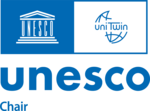
UNESCO Chair at the University College of Teacher Education in Lower Austria
With effect from March 1, 2024, the UNESCO Chair in Learning and Teaching Futures Literacy in the Anthropocene will be established at the University College of Teacher Education Lower Austria. Chair Carmen Sippl and Co-Chair Karin Tengler aim to anchor Futures Literacy in teacher education. Networking activities, training sessions, and research projects are planned for this purpose.
